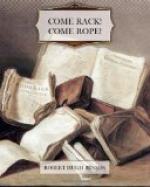* * * * *
She awaked suddenly. At the moment she did not know what time it was or how long she had slept; but it was still dark and deathly still. Yet she could have sworn that she had heard her name called. The rushlight was burned out; but in the summer night she could still make out the outline of Mistress Alice’s bed. Yet all was still there, except for the gentle breathing: it could not have been she who had called out in her sleep, or she would surely show some signs of restlessness.
She sat up listening; but there was not a sound. She lay down again; and the strange fancy seized her that it had been her mother’s voice that she had heard.... It was in this room that her mother had died.... Again she sat up and looked round. All was quiet as before: the tall press at the foot of her bed glimmered here and there with lines and points of starlight.
Then, as again she began to lie down, there came the signal for which her heart was expectant, though her mind knew nothing of its coming. It was a clear rap, as of a pebble against the glass.
She was up and out of bed in a moment, and was peering out under the thick arch of the little window. And a figure stood there, bending, it seemed, for another pebble; in the very place where she had seen it, she thought, nearly three weeks ago, standing ready to mount a horse.
Then she was at Alice’s bedside.
“Alice,” she whispered. “Alice! Wake up.... There is someone come. You must come with me. I do not know—” Her voice faltered: she knew that she knew, and fear clutched her by the throat.
* * * * *
The porter was fast asleep, and did not move, as carrying a rushlight she went past the buttery with her friend behind her saying no word. The bolts were well oiled, and came back with scarcely a sound. Then as the door swung slowly back a figure slipped in.
“Yes,” he said, “it is I.... I think I am followed.... I have but come—”
“Come in quickly,” she said, and closed and bolted the door once more.
II
It was a horrible delight to sit, wrapped in her cloak with the hood over her head, listening to his story in the hall, and to know that it was to her house that he had come for safety. It was horrible to her that he needed it—so horrible that every shred of interior peace had left her; she was composed only in her speech, and it was a strange delight that he had come so simply. He sat there; she could see his outline and the pallor of his face under his hat, and his voice was perfectly resolute and quiet. This was his tale.
“Twice this afternoon,” he said, “I saw a man against the sky, opposite my hut. It was the same man both times; he was not a shepherd or a farmer’s man. The night before, when David came, he did not speak to me; but for the first time he put his head in at the hut-door when he brought the food and made gestures that I could not understand. I looked at him and shook my head, but he would say nothing, and I remembered the bond and said nothing myself. All that he would do was to shut his eyes and wave his hands. Then this last night he brought no food at all.




